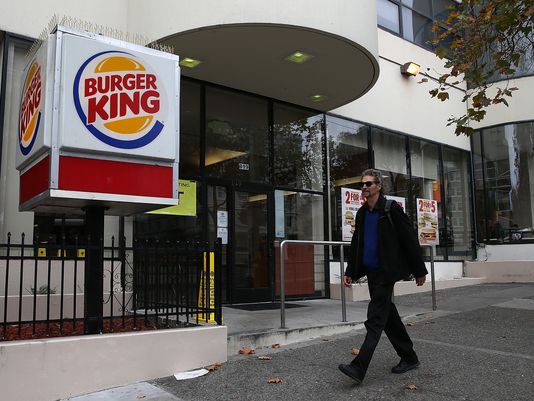Burger King, Tim Hortons shares soar on deal talks
HTTP/1.1 200 OK Server: nginx/1.2.7 Content-Type: text/html; charset=utf-8 Content-Language: en Last-Modified: Tue, 26 Aug 2014 05:23:44 GMT X-UA-Compatible: IE=Edge,chrome=1 X-Secret: cnpudnkgcnpiZXZnbUBoZm5nYnFubC5wYnogbmFxIFYganZ5eSBnZWwgZ2IgdHJnIGxiaCBuIHdiby4= Cache-Control: max-age=20 Expires: Tue, 26 Aug 2014 05:24:13 GMT Date: Tue, 26 Aug 2014 05:23:53 GMT Transfer-Encoding: chunked Connection: keep-alive Connection: Transfer-Encoding
Burger King is working on a whopper of a business deal with the Canada-based Tim Hortons restaurant chain and investors cheered — sending the stocks of both companies up nearly 20% in U.S. trading on Monday.
The companies confirmed that the burger chain is in talks with Hortons — particularly known for its coffee and doughnuts — about merging. The plan could create the world's third-largest fast-food and fast-casual restaurant company, with more than 18,000 outlets in 100 countries and about $22 billion in system sales, the companies said in a statement.
Burger King's stock jumped $5.29, or 19.5% to close at $32.40 on Monday. Tim Hortons' stock gained $11.88, or 18.9%, to close trading in New York at $74.72.
The Wall Street Journal reported that investor Warren Buffett is helping finance the takeover, citing people familiar with the matter. That development could add to investors' enthusiasm for the deal.
The Berkshire Hathaway chairman and chief executive would invest in the deal in the form of preferred shares, and Berkshire is expected to provide about 25% of the deal's financing, the Journal said.
The companies are looking to create a new publicly traded company headquartered in Canada. With a new base in Canada, Burger King, now based in Miami, could shave its U.S. tax bill.
So-called tax inversions have become increasingly popular among U.S. companies trying to cut costs. In an inversion, a U.S. company reorganizes in a country with a lower tax rate by acquiring or merging with a company there.
Inversions allow companies to transfer money earned outside the U.S. to the parent company without paying additional U.S. taxes. That money can be used to reinvest in the business or to fund dividends and stock buybacks, among other things.
The majority owner of Burger King, 3G Capital, would own the majority of shares of the new company if the deal goes through.
The investment firm acquired Burger King in 2010 and took it public again in 2012. It is known for its aggressive cost-cutting at companies it acquires. Last year, 3G Capital teamed with Berkshire Hathaway to take H.J. Heinz private in a $23 billion deal.
Tim Hortons ([1]THI[2]), an iconic Canadian brand co-founded by a Canadian pro hockey star, was purchased by Wendy's International in 1995, but was spun off by Wendy's as a separate public company in 2006.
The Burger King deal could allow Tim Hortons to accelerate its growth in international markets. The company had 4,546 restaurants as of June 29, with 3,630 in Canada, 866 in the U.S. and 50 in the Persian Gulf area.
The companies say Burger King Worldwide and Tim Hortons, based in Ontario, would continue to operate as separate brands — and the Burger King brand would keep its headquarters in Miami — but the firms would share corporate services.
Read or Share this story: http://usat.ly/1tAV0Aa
References
- ^ http://www.usatoday.com/money/lookup/stocks/THI/ (rssfeeds.usatoday.com)
- ^ http://www.usatoday.com/money/lookup/stocks/THI/ (rssfeeds.usatoday.com)










